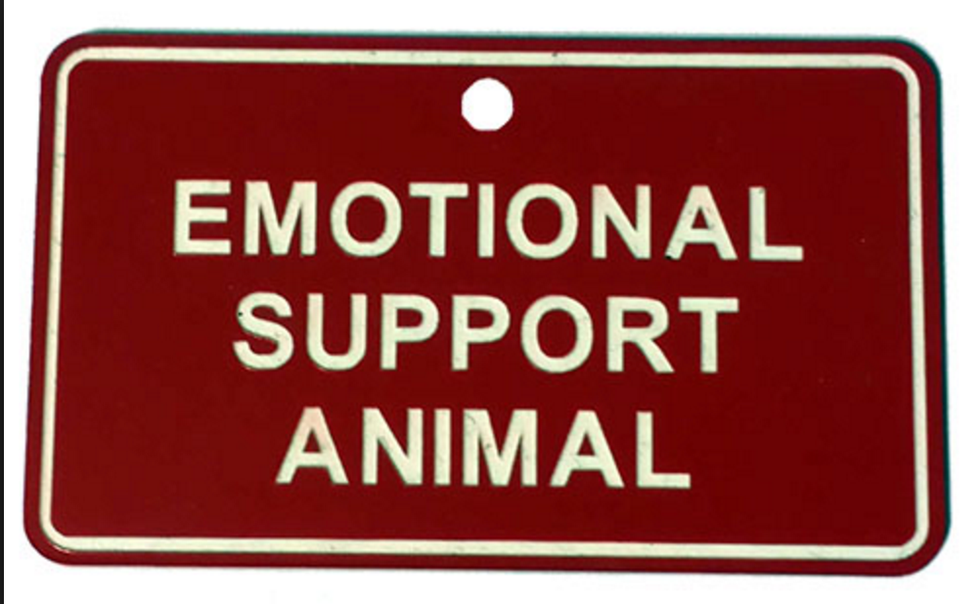When I first started training my service dog, it was for post-traumatic stress disorder, meaning his tasks would include: interrupting anxious behavior, distracting me through flashbacks/panic attacks to get my focus on him, waking me up from night terrors, etc.
Saxon alerting to anxiety in a doctor's office, a place where my anxiety is always through the roof. At the time, I was shaking my leg and this definitely redirected my focus to him.
It was not until I started getting more and more diagnoses causing me to teach him medical-alert related tasks. But due to posting so many clips of my service dog interrupting anxious behaviors, I noticed an increasing amount of people interpreting my disorder purely as anxiety, leading them to believe service dogs can be used for any and all cases of anxiety.
Anxiety disorders are the most common mental illness in America. LiveScience estimated that 31.9% of teens have an anxiety disorder. With 40 million adults over the age of 18 being affected, plus 31.9% of teens, it is clear that anxiety disorders seem to have become the norm in America.
It is no surprise with the fast food we eat, tuition money we pay, and hours we have to work that most of us will experience anxiety at one point or another in the United States, seeing as all these things contribute to mental health.
With that being said, if every teenager who was going through puberty interpreted their hormone changes as "anxiety" (which they do), there would be many service dogs being owner trained by 12 year olds (which there are). Not to mention that mental illnesses are the easiest thing to fake since "you can't fake blindness, deafness or non-functioning limbs." - Todd Smith
The term "psychiatric service dog" is becoming more known as "teens who are depressed and have anxiety" rather than "people who have gone through years of trauma" or "someone who has panic attacks because something triggered them." When I say "panic attacks," I mean full-blown hyperventilating and heart rate above 130. When I say "panic attacks," I mean someone who needs a dog there to regain focus because nothing is more distracting than the thought of your traumatic past. Nothing is more disturbing than reliving the hardest part of your life and constantly being reminded every time you leave the house. People with real, trained service dogs are disabled to the point where they may not be able to leave their house for months in fear of what awaits.
Even people without an anxiety disorder can feel anxious about particular things that make them nervous: giving public speeches, driving alone, etc. The difference here is that those kind of people need an ESA, emotional support dog. Although these dogs are not allowed in public, they do provide comfort and distraction when needed at home or in the car. Emotional support animals are not trained to do specific tasks, they are solely for comfort.
People who need ESAs do not need immediate help in public during panic episodes, seizures, narcolepsy, etc. Most people who train service dogs make the decision after trying many different therapies and medications, all which have failed, leaving only one option: a service animal.
I am not trying to belittle people with anxiety disorders, but the condition must be severe to be recommended a service dog. I am also trying to spread awareness about the dogs who wear this particular ID tag, claiming to be an "emotional support dog:"
This tag is bought online and comes with a "certification card." There is no doctor's note or training required to buy this tag, yet people buy it and claim their animal has public access rights.For all the business owners who have refused service to anyone who doesn't have this fake tag: you will sooner regret that when a real service animal has a case against your establishment and you sooner realize you have only been accepting fakes.
Consider the people who are under 21 but have a fake ID. Just because they hand it to the bartender and it gets accepted, doesn't mean it's real, but the bartender doesn't know this because he/she is assuming that anyone who hands them an ID is official.
To summarize, people should only have service dogs for anxiety if it is severe enough to disable them. People should not have a service dog if they get anxious or nervous sometimes. In this case, they should have an emotional support animal.


























